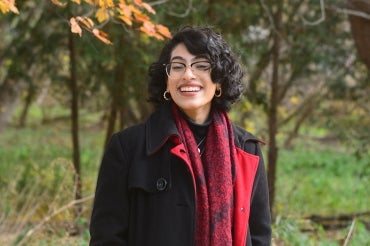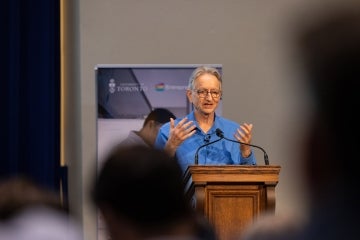Speaking her truth: U of T student on becoming the City of Mississauga's youth poet laureate

Tahira Rajwani, an undergraduate student studying psychology at U of T Mississauga, says her interests in poetry and psychology are driven by a desire to understand, help and build relationships with people (photo by Ava Richardson)
Published: July 7, 2025
Tahira Rajwani was only 15 years old when she first stepped on stage to perform her original spoken word poetry, but she says it immediately felt like home.
“I was nervous, but the way my poem came out just felt so natural,” says the undergraduate psychology student at the University of Toronto Mississauga. “The way people talked about how my performance resonated with them told me that this was an art form that I could make an impact with.”
Since that performance, Rajwani has used spoken word as an outlet to explore social justice issues and reach people who might not otherwise engage with them.
She now hopes to build on that impact and create more space for underrepresented voices as the City of Mississauga’s fifth youth poet laureate after being selected by the city to serve as a literary ambassador tasked with advancing poetry, literary arts and the voices of young writers.
“It was something I’d been thinking about for a long time,” she says of the two-year honorary role. “It was a really exciting moment when I found out.”
A prolific reader and short-story writer since early childhood, Rajwani’s passion for poetry was first sparked by a YouTube channel called Button Poetry, where spoken word performances rack up millions of views.
“Watching those videos was a transformative experience for me,” says Rajwani, who was captivated by the wide range of issues the artists addressed.
Initially, Rajwani’s poetry was more personal than political. “I wrote for myself in the beginning as a way to cope with teen angst,” she says.
These days, her performances tend to focus on women’s empowerment and diaspora. “Spoken word is rooted in oral storytelling traditions and lends itself very well to marginalized stories,” she says. “It often expresses narratives of oppression, but also of resilience. And it feels more accessible than written poetry for many people. It was definitely that way for me.”
Rajwani, a South Asian Canadian, says she writes for two audiences. “I aim to speak to communities that have similar experiences of being part of a diaspora, so they feel seen and heard and represented, but I also want to share those experiences with people who have never encountered these struggles.”
Sometimes, audience members tell her they had little or no interest in poetry until they heard her perform.
“It’s really special to me because I'm able to help redefine the medium for folks and show the community that it’s something they can enjoy and use to tell their own stories,” says Rajwani, who was recently shortlisted for the 2024 League of Canadian Poets Spoken Word Award and earned second place at the 2025 Canadian Individual Poetry Slam in Vancouver.
Aside from a few performances at U of T Mississauga, Rajwani has largely kept her academics and art separate. But she says her studies have deepened her understanding of the human experiences she explores in her writing. “The same thing that drives my interest in psychology drives my interest in poetry – understanding, helping and building relationships with people.”
As Mississauga's youth poet laureate, Rajwani hopes to get fellow students excited about poetry. She says one of her top priorities will be to revive an open mic series that she helped launch called Sauga Poetry, which has been on a hiatus.
She also wants to help grow opportunities and foster community for spoken word artists in Mississauga.
“I want to give youth here a platform to share their work and connect with other artists,” she says. “It’s something that I wished I had when I was coming up as a poet.”



